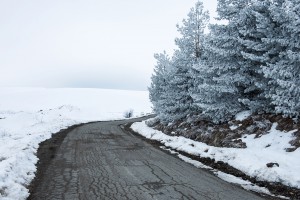How Frost Heaves Can Damage Your Driveway And Foundation
Most people only worry about the snow and ice melting and causing water damage in the spring, but what is it doing to your home during winter? The fact of the matter is that the cold temperatures cause the groundwater to freeze, which can be damaging to your home’s foundation. There are a couple of different factors that could harm the walls of a foundation.
Frost Heaves
To understand frost heaves, you first need to understand ice lenses. An ice lens forms in the soil a few centimeters below the surface. When the groundwater freezes often the weight of the soil above it doesn’t allow the water to expand vertically. However when more water freezes, it continues to expand horizontally, adding pressure until the ice buckles, pushing upward toward the surface lifting the soil, foundation, or pavement with it. This bump in the soil is what we know to be a frost heave. This displacement of the surface above the lens can distort the ground and is a major cause for pothole creation during the winter. Frost heaves generally affect sidewalks or roads, but they can affect homes without basements as well. The foundation does not run as deep on homes without basements, so the freezing of water near the surface and the distortion of the ground can directly shift or crack a home’s foundation.
Freezing Soil
This may seem like the exact same thing as a frost heave, but there are a few key differences. When water within soil freezes it causes the ground to expand in all directions because water molecules naturally expand in freezing temperatures. The expansion causes excess pressure to be applied to your home’s foundation. The pressure can cause your foundation to crack and will make it more susceptible to leaks during the spring when the snow melts. Throughout the winter season it’s likely that the temperature will vary from above freezing to well below freezing. As the temperature rises, any snow or ice will melt, causing water runoff that could enter any pre-existing cracks in your home’s foundation. When the temperature, then, drops below freezing again, the water in the cracks will refreeze, expand, and create larger fractures in the foundation’s walls. This process is quite common, but can easily go unnoticed until the spring when the snow melts and a leak begins.
Frost heaves and soil freezing will not affect every home, but it is something to be on the lookout for. Some telltale signs of foundation damage are leaks in your basement, visible shifts of the ground bordering your home, and uneven flooring within your home. If you notice any of these signs in your home and are in need of driveway or foundation inspections give us a call at Lior Excavating. For pricing information click here for a free quote.

